Inside this Article
SiteGround or GoDaddy? While these two popular services offer similar hosting solutions, they’re also noticeably different. GoDaddy has a notorious reputation for overloading its servers and for being easily hackable.
To make a brutally honest comparison between SiteGround and GoDaddy, I tested both hosts across five different categories including pricing, features, and performance. SiteGround came out a winner in all five categories.
Nevertheless, I wouldn’t say that SiteGround is the best host around. It may be faster and more reliable than GoDaddy, but it isn’t as impressive as Hostinger.
Click here to see SiteGround’s best deals, or read on to see how each service performed.
If you want to host more than five websites, GoDaddy offers four Pro plans that give you from 5 to 50 hosted websites, from 50 GB to 200 GB disk space, and free professional email for the first year.
SiteGround charges the same prices and package renewal fees for its shared and managed WordPress hosting plans. SiteGround doesn’t offer a free domain, but it offers a free SSL certificate and several other freebies with all three plans. All plans are also backed by a 30-day money-back guarantee.
GoDaddy’s managed WordPress plans are more expensive than its shared hosting packages. GoDaddy’s Pro plans are even more expensive than the single-site packages and SiteGround’s managed WordPress hosting plans.
All GoDaddy’s WordPress hosting plans come with a free domain for the first year. However, only the higher-value single site plans and Pro plans come with a free SSL certificate. GoDaddy offers a 30-day money-back guarantee with annual plans, and a 48-hour refund with monthly subscriptions.
Even though GoDaddy offers more plans for WordPress hosting, you’ll need to sign up for its Pro packages (which are very expensive) in order to get more resources and benefit from some free extras. On the other hand, SiteGround’s WordPress hosting may be more expensive than GoDaddy’s single-site WordPress hosting plans, but you get more high-end features. That’s why SiteGround wins the pricing round.
If you want to get even more premium features at an even more affordable cost, I suggest that you go with Hostinger instead.
SiteGround beats GoDaddy in this challenge as it offers more value-added features with its managed WordPress hosting plans. However, I find Hostinger’s offerings even more valuable.
![SiteGround - Performance (UptimeRobot)]() Using the same test with GoDaddy, it showed an actual uptime of 99.974% and 99.957% over a period of one month. Even though GoDaddy exceeds its uptime guarantee (99.9%), it clearly experiences more downtime than SiteGround.
Using the same test with GoDaddy, it showed an actual uptime of 99.974% and 99.957% over a period of one month. Even though GoDaddy exceeds its uptime guarantee (99.9%), it clearly experiences more downtime than SiteGround.
![GoDaddy - Performance (UptimeRobot)]() I used Sucuri to test SiteGround’s page loading speed from different locations around the world. The server locations in North America and some in Europe showed promising load times, but other locations in Europe and Asia showed much slower loading speeds. This resulted in a total score of B, which isn’t impressive.
I used Sucuri to test SiteGround’s page loading speed from different locations around the world. The server locations in North America and some in Europe showed promising load times, but other locations in Europe and Asia showed much slower loading speeds. This resulted in a total score of B, which isn’t impressive.
![SiteGround - Performance (Sucuri)]() Find more details about SiteGround’s performance in this in-depth SiteGround review.
On the other hand, GoDaddy didn’t show any good loading speeds across all locations. The initial connection speeds were good, but the first byte loading time and the overall loading speeds were very slow. This resulted in a very disappointing global score of an F.
Find more details about SiteGround’s performance in this in-depth SiteGround review.
On the other hand, GoDaddy didn’t show any good loading speeds across all locations. The initial connection speeds were good, but the first byte loading time and the overall loading speeds were very slow. This resulted in a very disappointing global score of an F.
![GoDaddy - Performance (Sucuri)]() See what went wrong with GoDaddy’s performance in this full GoDaddy review.
To get a more itemized performance test result, I used GTmetrix to test SiteGround’s page loading speeds from a specific server location (the US). It scored an impressive page loading score of B, at 88%, and an even better YSlow score at 90%.
See what went wrong with GoDaddy’s performance in this full GoDaddy review.
To get a more itemized performance test result, I used GTmetrix to test SiteGround’s page loading speeds from a specific server location (the US). It scored an impressive page loading score of B, at 88%, and an even better YSlow score at 90%.
![SiteGround - Performance (GTMetrix)]() I performed the same test on GoDaddy using the same server location, but GoDaddy’s fastest loading speeds were equivalent to some hosts’ slowest loading speeds. With GTmetrix it scores a good page loading score of A, at 94%, but a disappointing YSlow score of C, at 72%.
I performed the same test on GoDaddy using the same server location, but GoDaddy’s fastest loading speeds were equivalent to some hosts’ slowest loading speeds. With GTmetrix it scores a good page loading score of A, at 94%, but a disappointing YSlow score of C, at 72%.
![GoDaddy - Performance (GTMetrix)]() Now, let’s compare SiteGround and GoDaddy in terms of performance-boosting features.
SiteGround operates its services through its data centers located in the US, UK, the Netherlands, Singapore, and Australia. GoDaddy, on the other hand, only has servers in the US and India.
SSD storage is used with all of SiteGround’s plans, but GoDaddy only uses it with specific plans. SSD storage performs much faster than the traditional HDD storage which reflects on the website’s loading speed, stability, and overall performance.
CDN (Content Delivery Network) boosts the loading speed of your website from different locations around the world by placing it on a global network of cloud servers. SiteGround includes a free CDN with all its plans, but GoDaddy only includes it with its WordPress hosting plans.
Even though SiteGround outscored GoDaddy in the performance and loading speed tests, and offers more performance-boosting features, it doesn’t come close to our top performing web host, Hostinger.
SiteGround wins the performance round, but if you’re looking for a truly fast and reliable web host, you won’t go wrong with Hostinger!
Now, let’s compare SiteGround and GoDaddy in terms of performance-boosting features.
SiteGround operates its services through its data centers located in the US, UK, the Netherlands, Singapore, and Australia. GoDaddy, on the other hand, only has servers in the US and India.
SSD storage is used with all of SiteGround’s plans, but GoDaddy only uses it with specific plans. SSD storage performs much faster than the traditional HDD storage which reflects on the website’s loading speed, stability, and overall performance.
CDN (Content Delivery Network) boosts the loading speed of your website from different locations around the world by placing it on a global network of cloud servers. SiteGround includes a free CDN with all its plans, but GoDaddy only includes it with its WordPress hosting plans.
Even though SiteGround outscored GoDaddy in the performance and loading speed tests, and offers more performance-boosting features, it doesn’t come close to our top performing web host, Hostinger.
SiteGround wins the performance round, but if you’re looking for a truly fast and reliable web host, you won’t go wrong with Hostinger!
![SiteGround - Support]() GoDaddy has multiple global call centers serving different countries around the world with 24/7 phone support. There’s also a 24/7 live chat channel, but the agents weren’t as helpful as I expected. There were clear language and knowledge gaps with the agents due to the support being outsourced.
GoDaddy has multiple global call centers serving different countries around the world with 24/7 phone support. There’s also a 24/7 live chat channel, but the agents weren’t as helpful as I expected. There were clear language and knowledge gaps with the agents due to the support being outsourced.
![GoDaddy - Support]() SiteGround’s customer support is much more reliable than GoDaddy’s support, making it the winner of this round.
SiteGround’s customer support is much more reliable than GoDaddy’s support, making it the winner of this round.
1. Plans and Pricing
GoDaddy Offers More WordPress Hosting Plans, but SiteGround Offers Better Value for Money
Both SiteGround and GoDaddy offer managed WordPress hosting for individuals, and small to medium businesses. But, which one gives you your money’s worth? With SiteGround’s three managed WordPress hosting plans, you get 10 GB to 40 GB SSD storage, 10,000 to 100,000 monthly visitors, unlimited email accounts, and unlimited databases. You can also host from 1 to unlimited websites. With GoDaddy’s four managed WordPress hosting plans for single sites, you get 1 hosted website, from 30 GB to unlimited traditional storage (not SSD), from 25K to unlimited monthly visitors, and free business email for the first year. SiteGround Web Hosting
Plan NameStorageBandwidthFree SSLNumber of SitesPrice
More detailsA free domain name is included with some hosting plans from SiteGround
GoDaddy Hosting Web Hosting
Plan NameStorageBandwidthFree SSLNumber of SitesPrice
More detailsA free domain name is included with some hosting plans from GoDaddy Hosting
2. Features
SiteGround Offers More High-End Features and More Freebies
We’ve already established that you get a free SSL certificate with all SiteGround plans and only with GoDaddy’s higher-value plans. What else do you get for free with SiteGround and GoDaddy then? With SiteGround’s WordPress hosting, you get free WordPress installation, auto-updates, migrator tool, daily backups, free CDN as well as free developer tools (SSH access and WP-CLI), free shopping cart, and free Weebly site builder. With SiteGround’s higher-value plans (GrowBig andGoGeek), you get speed-boosting caching, site staging, and you can also add collaborators to your website where they get their own SiteGround accounts. In addition, the GoGeek plan provides you with free White-Label Clients, priority support, pre-installed Got, and access to more server resources. On the other hand, GoDaddy offers daily backups for up to 90 days, free CDN, and SEO optimizer (except for the basic plan). All Pro packages include site staging, developer tools (SSH access, Git integration, and WP-CLI), and free image library (1,000+ royalty free images). While GoDaddy uses cPanel and Plesk control panels for its hosting plans, SiteGround has developed its own control panel, SiteTools, which is even easier to use and comes with more advanced plugins and features. Check out the following table to further compare SiteGround and GoDaddy:| SiteGround | GoDaddy | |
| Hosting Types | Shared, WordPress hosting, WooCommerce, cloud, reseller, dedicated servers. | Shared (Linux and Windows), reseller, WordPress hosting(managed and unmanaged), VPS, dedicated servers |
| Free Domain | ✘ | ✔ |
| Free SSL Certificate | ✔ | With certain plans |
| Disk Space | 10 GB to 120 GB | 20 GB – Unlimited |
| Bandwidth | Unmetered | Unlimited |
| Automatic Backups | Daily | ✔ |
| Control Panel | Site Tools | cPanel, Plesk |
| Email Accounts | Unlimited | 1 Free |
| Free CDN | ✔ | With WordPress hosting only |
| Free Site Migration | Yes, but not on the cheapest shared or WordPress plans | Only with the fully managed WordPress hosting plans |
| Money-Back Guarantee | 30 days | 48 hours or 30 days |
3. Performance
SiteGround has Better Uptime and Faster Loading Speeds
SiteGround promises a 99.9% uptime guarantee. However, when tested over a period of three months (using UptimeRobot) it showed an average actual uptime of 99.997% throughout the testing period and a perfect average actual uptime of 100% over one month. This means that the websites hosted with SiteGround rarely experience downtimes.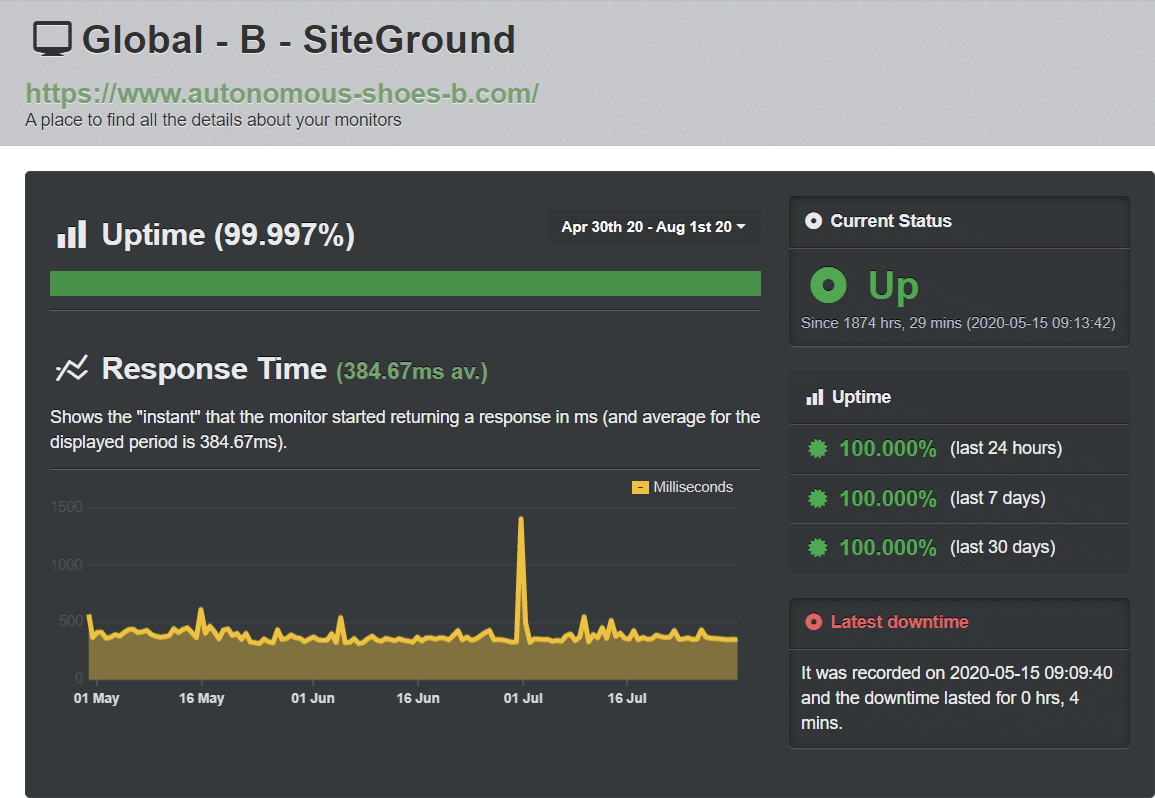 Using the same test with GoDaddy, it showed an actual uptime of 99.974% and 99.957% over a period of one month. Even though GoDaddy exceeds its uptime guarantee (99.9%), it clearly experiences more downtime than SiteGround.
Using the same test with GoDaddy, it showed an actual uptime of 99.974% and 99.957% over a period of one month. Even though GoDaddy exceeds its uptime guarantee (99.9%), it clearly experiences more downtime than SiteGround.
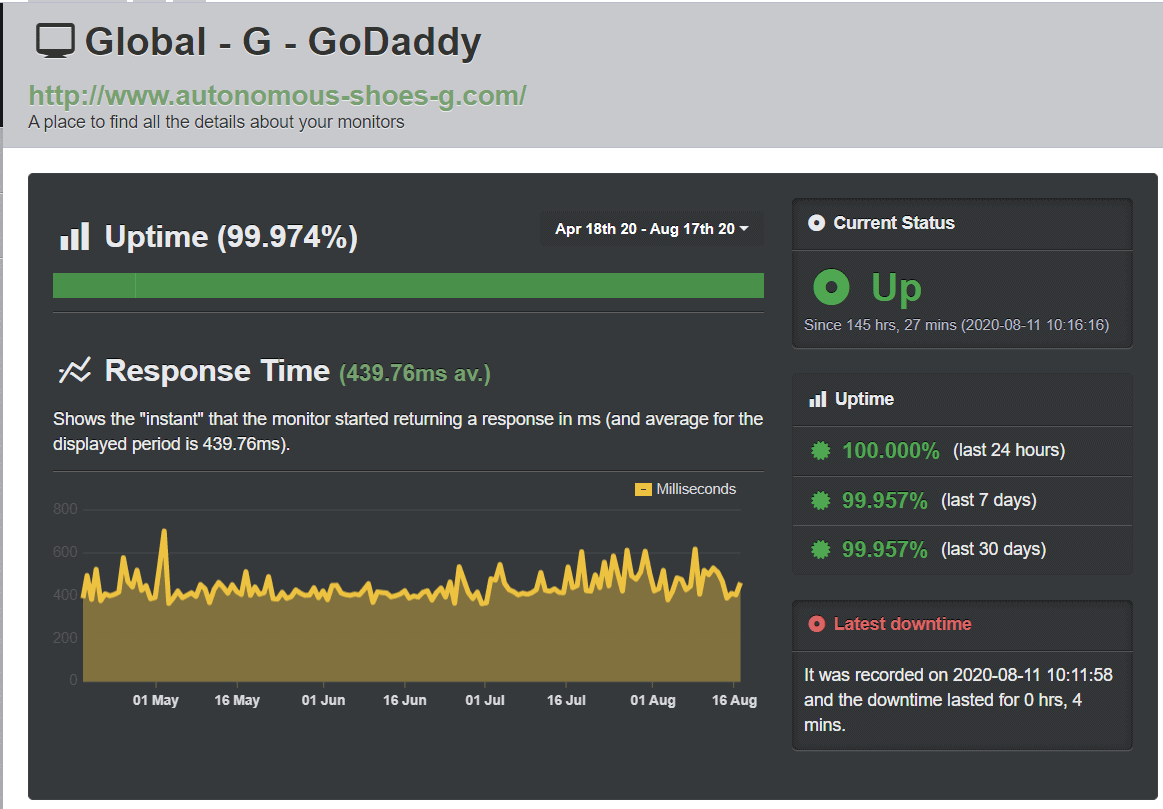 I used Sucuri to test SiteGround’s page loading speed from different locations around the world. The server locations in North America and some in Europe showed promising load times, but other locations in Europe and Asia showed much slower loading speeds. This resulted in a total score of B, which isn’t impressive.
I used Sucuri to test SiteGround’s page loading speed from different locations around the world. The server locations in North America and some in Europe showed promising load times, but other locations in Europe and Asia showed much slower loading speeds. This resulted in a total score of B, which isn’t impressive.
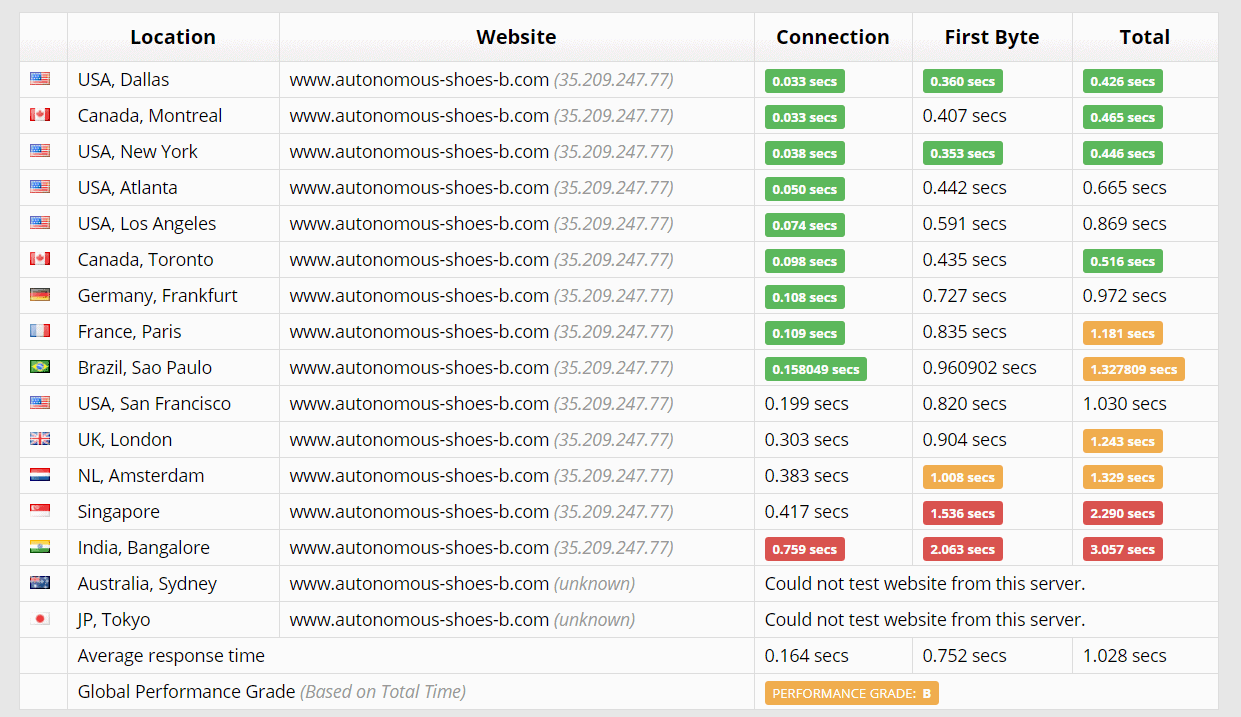 Find more details about SiteGround’s performance in this in-depth SiteGround review.
On the other hand, GoDaddy didn’t show any good loading speeds across all locations. The initial connection speeds were good, but the first byte loading time and the overall loading speeds were very slow. This resulted in a very disappointing global score of an F.
Find more details about SiteGround’s performance in this in-depth SiteGround review.
On the other hand, GoDaddy didn’t show any good loading speeds across all locations. The initial connection speeds were good, but the first byte loading time and the overall loading speeds were very slow. This resulted in a very disappointing global score of an F.
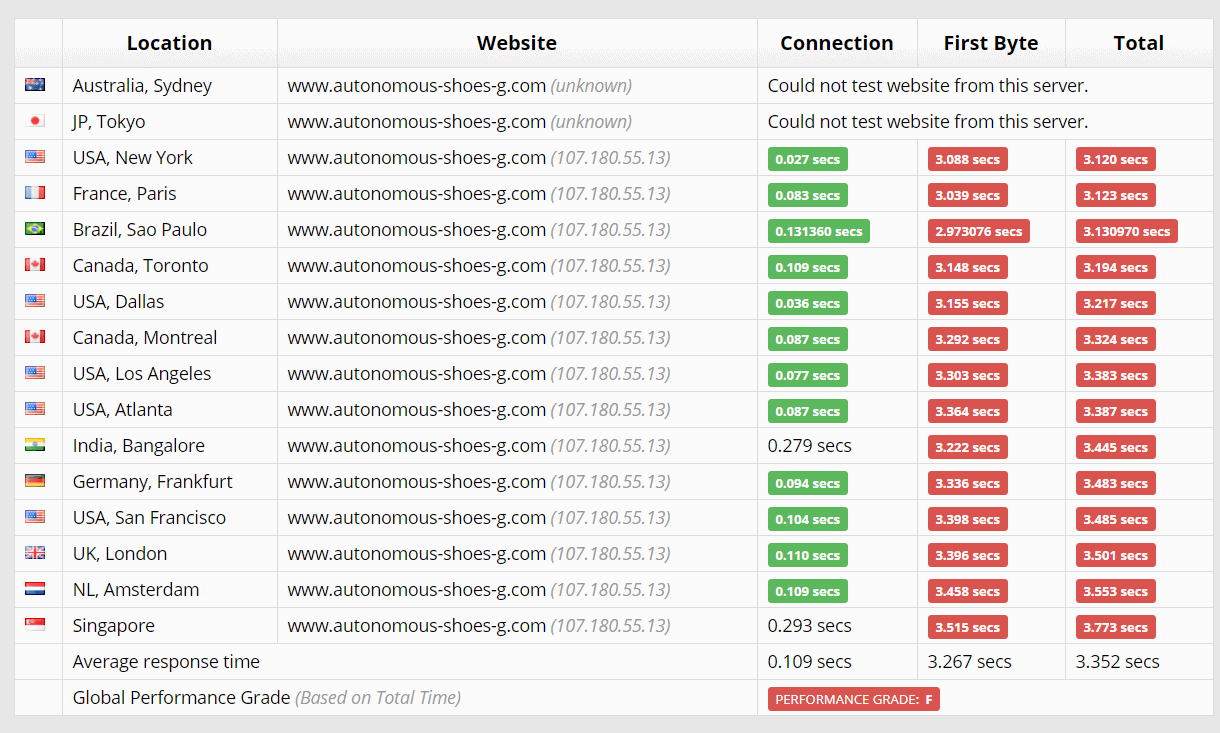 See what went wrong with GoDaddy’s performance in this full GoDaddy review.
To get a more itemized performance test result, I used GTmetrix to test SiteGround’s page loading speeds from a specific server location (the US). It scored an impressive page loading score of B, at 88%, and an even better YSlow score at 90%.
See what went wrong with GoDaddy’s performance in this full GoDaddy review.
To get a more itemized performance test result, I used GTmetrix to test SiteGround’s page loading speeds from a specific server location (the US). It scored an impressive page loading score of B, at 88%, and an even better YSlow score at 90%.
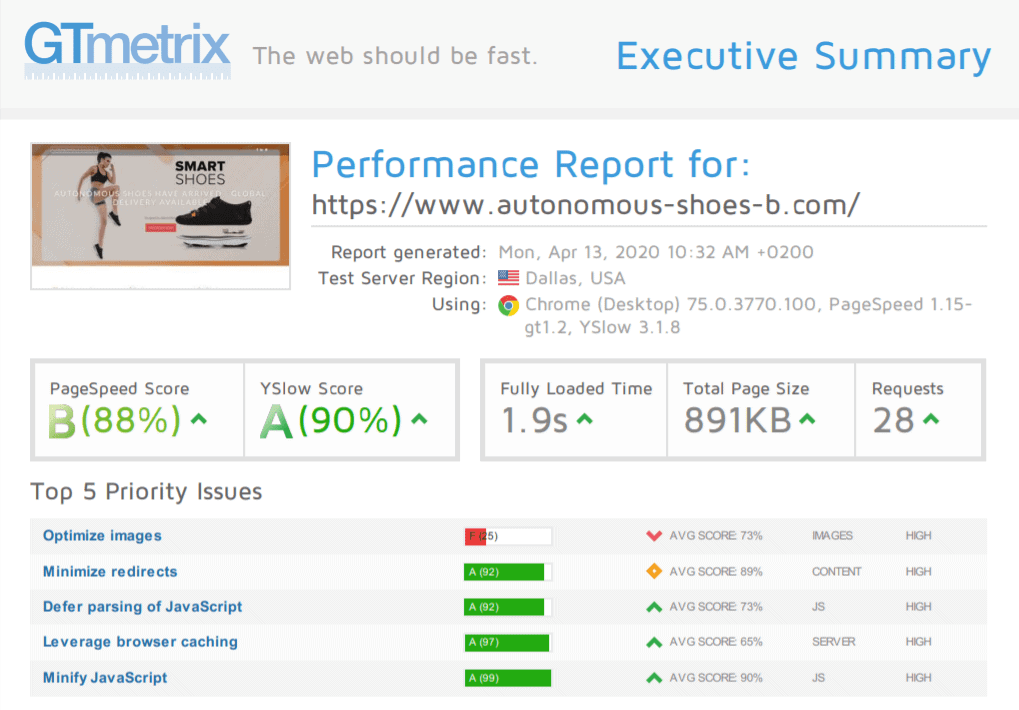 I performed the same test on GoDaddy using the same server location, but GoDaddy’s fastest loading speeds were equivalent to some hosts’ slowest loading speeds. With GTmetrix it scores a good page loading score of A, at 94%, but a disappointing YSlow score of C, at 72%.
I performed the same test on GoDaddy using the same server location, but GoDaddy’s fastest loading speeds were equivalent to some hosts’ slowest loading speeds. With GTmetrix it scores a good page loading score of A, at 94%, but a disappointing YSlow score of C, at 72%.
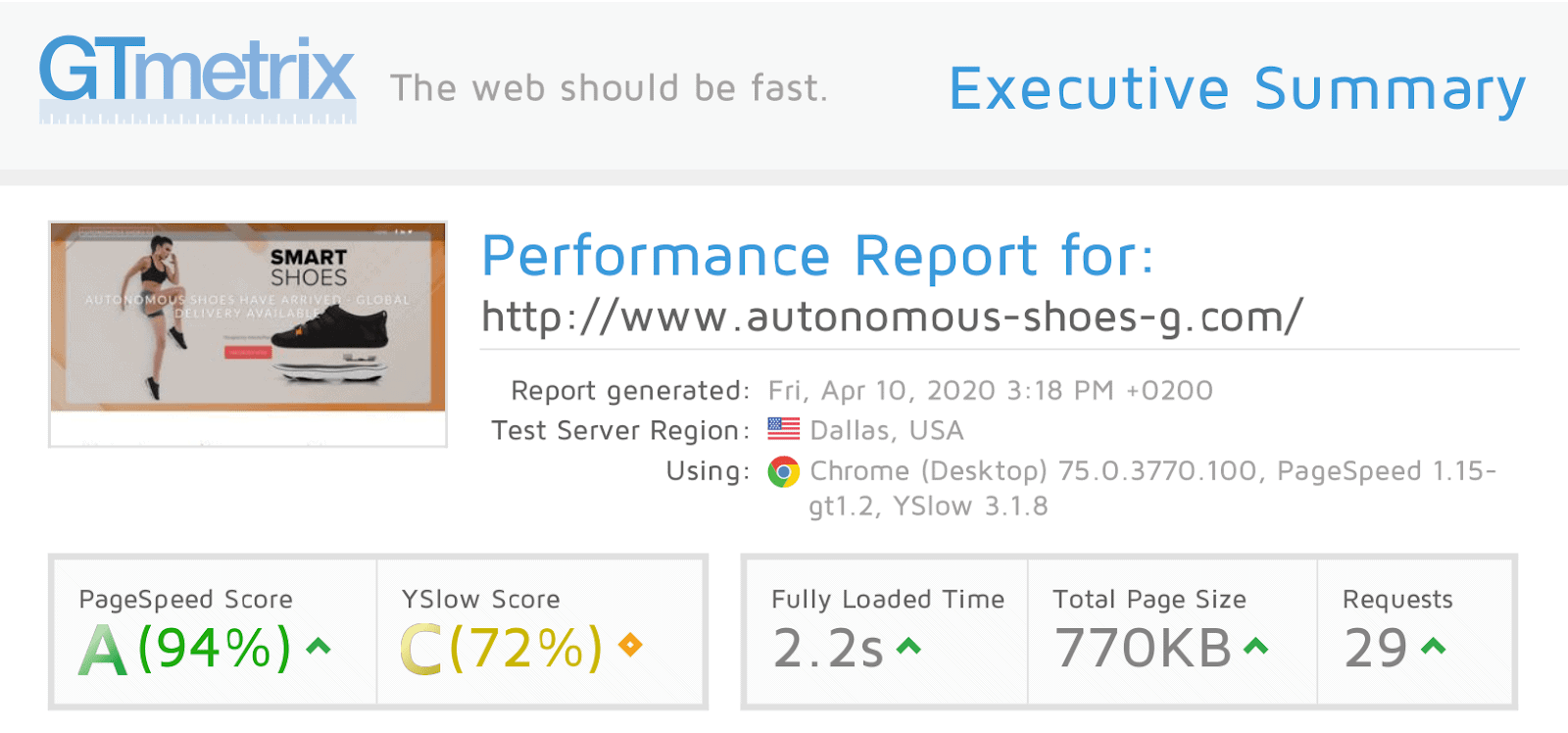 Now, let’s compare SiteGround and GoDaddy in terms of performance-boosting features.
SiteGround operates its services through its data centers located in the US, UK, the Netherlands, Singapore, and Australia. GoDaddy, on the other hand, only has servers in the US and India.
SSD storage is used with all of SiteGround’s plans, but GoDaddy only uses it with specific plans. SSD storage performs much faster than the traditional HDD storage which reflects on the website’s loading speed, stability, and overall performance.
CDN (Content Delivery Network) boosts the loading speed of your website from different locations around the world by placing it on a global network of cloud servers. SiteGround includes a free CDN with all its plans, but GoDaddy only includes it with its WordPress hosting plans.
Even though SiteGround outscored GoDaddy in the performance and loading speed tests, and offers more performance-boosting features, it doesn’t come close to our top performing web host, Hostinger.
SiteGround wins the performance round, but if you’re looking for a truly fast and reliable web host, you won’t go wrong with Hostinger!
Now, let’s compare SiteGround and GoDaddy in terms of performance-boosting features.
SiteGround operates its services through its data centers located in the US, UK, the Netherlands, Singapore, and Australia. GoDaddy, on the other hand, only has servers in the US and India.
SSD storage is used with all of SiteGround’s plans, but GoDaddy only uses it with specific plans. SSD storage performs much faster than the traditional HDD storage which reflects on the website’s loading speed, stability, and overall performance.
CDN (Content Delivery Network) boosts the loading speed of your website from different locations around the world by placing it on a global network of cloud servers. SiteGround includes a free CDN with all its plans, but GoDaddy only includes it with its WordPress hosting plans.
Even though SiteGround outscored GoDaddy in the performance and loading speed tests, and offers more performance-boosting features, it doesn’t come close to our top performing web host, Hostinger.
SiteGround wins the performance round, but if you’re looking for a truly fast and reliable web host, you won’t go wrong with Hostinger!
4. Security
SiteGround Offers a Wider Range of Security Features
SiteGround includes a decent range of security features with all its plans. These include web application firewall (WAF), it’s own artificial intelligence (AI) anti-bot system (protects against malicious attacks including DDoS and Brute-Force attacks), 24/7 server monitoring, and access to the Sucuri-developed SG Scanner (antimalware). On the other hand, GoDaddy’s main security features are limited to 24/7 server monitoring and DDoS protection. While GoDaddy uses CloudLinux OS with all its Linux-based shared hosting, SiteGround uses a similar system called Unique Account Isolation. Both these systems are responsible for securely isolating each account on a shared server from other accounts on the same server. This protects it against any threats or problems targeting the other accounts. At the same time these systems ensure the fair allocation of the server’s resources among all accounts. SiteGround includes free SSL certificates with all its plans, but GoDaddy only includes them with specific plans. Mostly the higher value shared hosting plans and the server plans. SiteGround also includes free automatic daily backups with all its plans while GoDaddy only includes it with specific plans. SiteGround is the clear winner here as it offers a much wider range of inclusive security features than GoDaddy.5. Support
SiteGround’s Support Staff are More Knowledgeable and Helpful
The SiteGround and GoDaddy websites feature highly comprehensive knowledge base sections containing numerous articles and tutorials that cover a wide range of major topics. Both websites categorize and organize all their content effectively, ensuring the required information is easy to locate. SiteGround’s customer support is available 24/7 through live chat, phone, and ticket support. However, the ticket is only available for existing customers. I went for the live chat option where I was instantly connected to an agent. The agent was very helpful, knowledgeable, and answered all my questions promptly.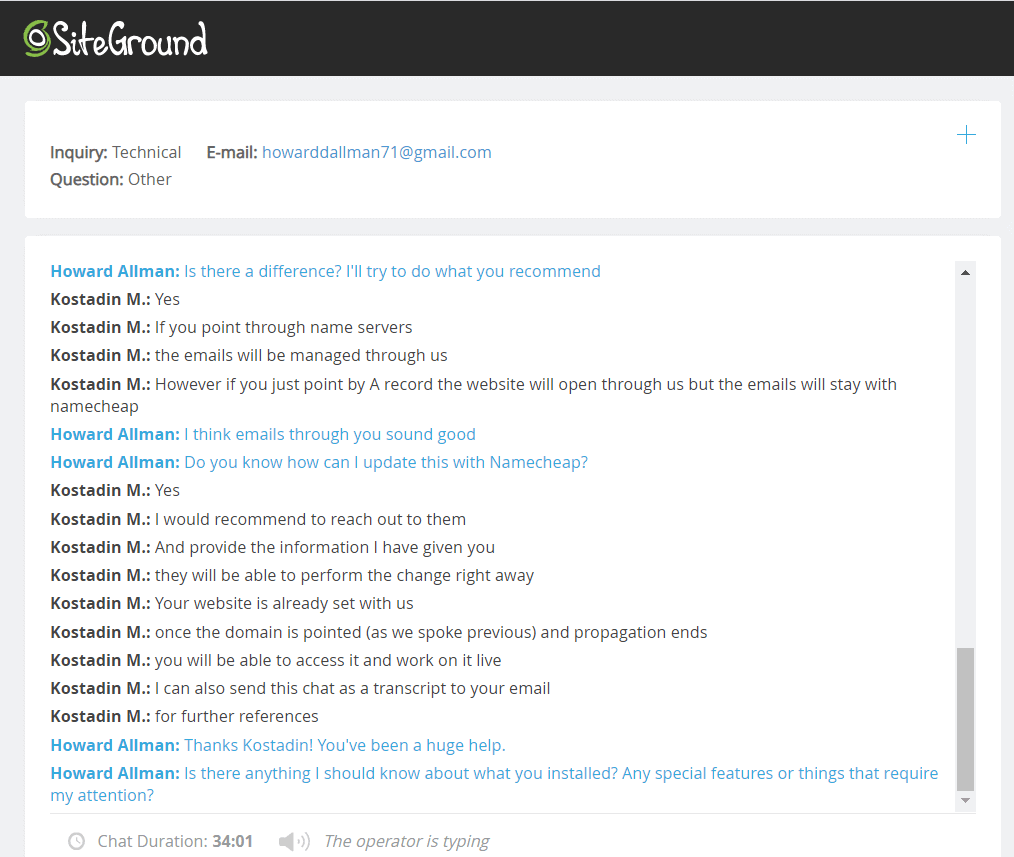 GoDaddy has multiple global call centers serving different countries around the world with 24/7 phone support. There’s also a 24/7 live chat channel, but the agents weren’t as helpful as I expected. There were clear language and knowledge gaps with the agents due to the support being outsourced.
GoDaddy has multiple global call centers serving different countries around the world with 24/7 phone support. There’s also a 24/7 live chat channel, but the agents weren’t as helpful as I expected. There were clear language and knowledge gaps with the agents due to the support being outsourced.
 SiteGround’s customer support is much more reliable than GoDaddy’s support, making it the winner of this round.
SiteGround’s customer support is much more reliable than GoDaddy’s support, making it the winner of this round.
GoDaddy Loses Out to SiteGround, but I’d Choose Hostinger
SiteGround defeated GoDaddy in all five categories. It offers better value for your money through its feature-rich managed WordPress hosting packages, offering more freebies that you can benefit from, better customer support and security. I’m not surprised to find it in this expert list of the best web hosting services. Despite its victory in this SiteGround vs GoDaddy comparison, I wouldn’t choose either host, and actually go for Hostinger instead. Compared to SiteGround and GoDaddy, Hostinger has far better performance and offers more quality hosting solutions at extremely affordable prices.SiteGround
GoDaddy
Plans and Pricing
Offers fewer plans. 30-day money-back guarantee
Offers more plans. 48-hour to 30-day money-back guarantee.
Key Features
Free website migration, free SSL, SSD storage, unlimited email accounts, free website builder.
Free domain, free SSL with some plans, free site migration with some plans, SSD storage with some plans.
Performance
More server locations, free CDN with all plans, 99.9% uptime guarantee, no downtimes, faster loading speeds
Fewer server locations, free CDN with specific plans, 99.9% uptime guarantee, few downtimes, slower loading speeds
Security
WAF, AI anti-bot system, 24/7 server monitoring, SG Scanner (antimalware), Unique Account Isolation, free daily backups with all plans
DDoS protection, 24/7 server monitoring, CloudLinux OS, free daily backups with specific plans
Support
Comprehensive and organized knowledge base, 24/7, live chat, phone, ticket support (for customers only), support staff is responsive and very helpful
Comprehensive and organized knowledge base, 24/7, live chat, phone (global call center), support staff is responsive but not helpful









![How To Start a Clothing Store Online: A 6-Step Guide [2024]](https://dt2sdf0db8zob.cloudfront.net/wp-content/uploads/2024/06/How-To-Start-a-Clothing-Store-Online-img-02-e1718982195142-850x485.png)






![How To Start a Food Blog in 5 Easy Steps [2024 Guide]](https://dt2sdf0db8zob.cloudfront.net/wp-content/uploads/2024/05/How-to-Start-A-Food-Blog-in-5-Easy-Steps-CurrentYear-Guide-e1715367475336-850x487.png)


